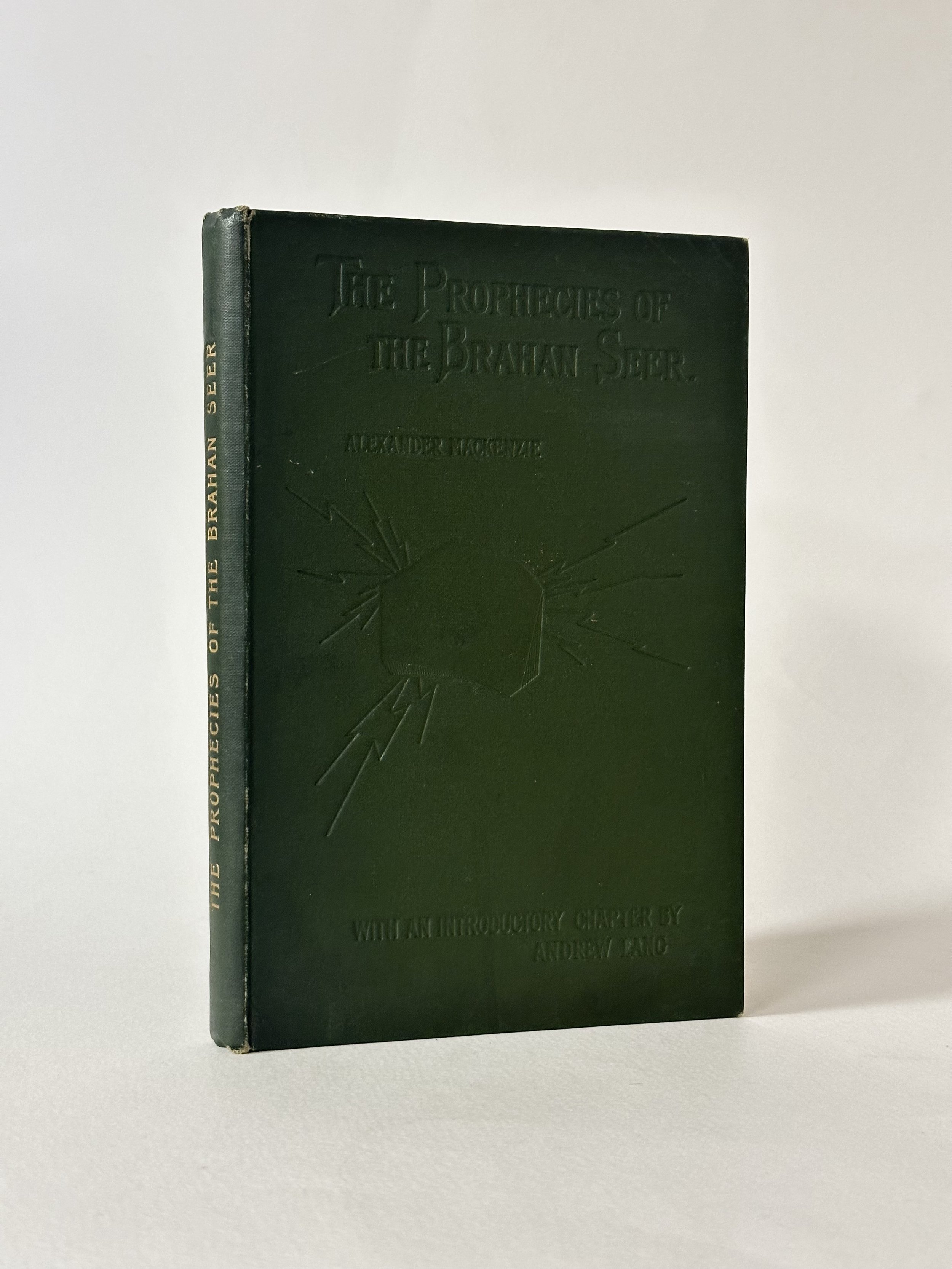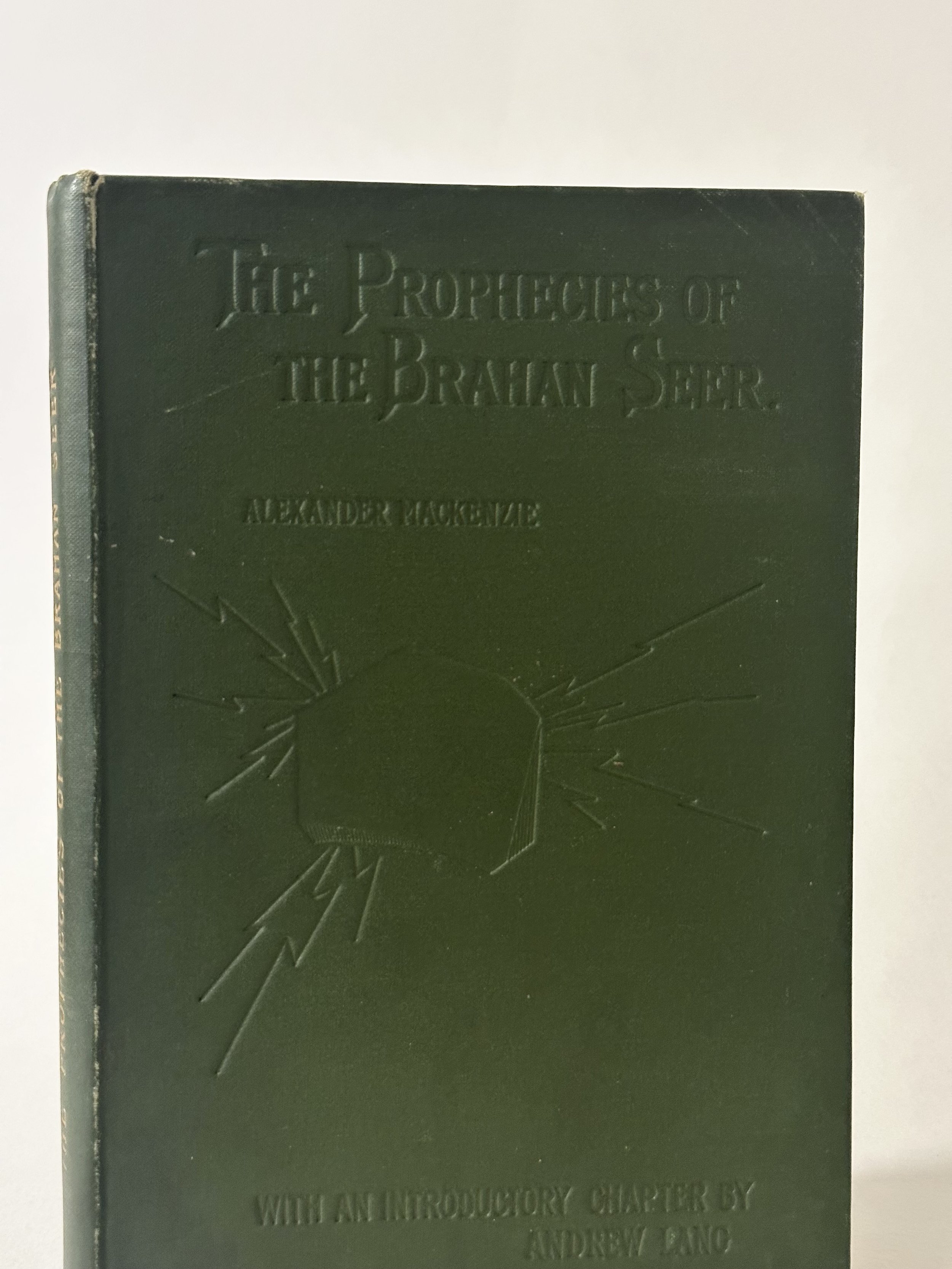 Image 1 of 2
Image 1 of 2

 Image 2 of 2
Image 2 of 2



MACKENZIE, Alexander. The Prophecies of the Brahan Seer
MACKENZIE, Alexander. The Prophecies of the Brahan Seer. With an introductory chapter by Andrew Lang. Stirling: Eneas Mackay. 1899. 8vo. First edition. Publisher’s olive cloth lettered in gilt to spine with blindstamped design to front board. Edges untrimmed. A very good or better copy, the cloth clean and bright, the corners and tips very gently bumped. The binding tight and square, the contents clean and fine, though a handful of the leaves roughly opened with small chips at fore-edge, minor.
A fascinating account of Coinneach Odhar Fiosaiche, or Kenneth Mackenzie, known more widely as The Brahan Seer, a 17th century predictor of the future. Meagre evidence suggests such a seer lived in 16th century Scotland and was wanted for witchcraft, but Mackenzie’s account here somewhat muddies the water. Mackenzie suggests the Brahan Seer predicted various battles and events, and later the discovery of North Sea oil, the arrival of Margaret Thatcher, among other things, then moves to Brahan Castle of Clan Mackenzie where he met his brutal, sadistic end—as many supposed occultists did (one would think they would’ve foreseen their demises). However, there is no evidence to consolidate our author’s account, and thus the very existence of the Brahan Seer remains in harmonious mystery, and we as reader are left with a still captivating piece of highland folklore. Uncommon.
MACKENZIE, Alexander. The Prophecies of the Brahan Seer. With an introductory chapter by Andrew Lang. Stirling: Eneas Mackay. 1899. 8vo. First edition. Publisher’s olive cloth lettered in gilt to spine with blindstamped design to front board. Edges untrimmed. A very good or better copy, the cloth clean and bright, the corners and tips very gently bumped. The binding tight and square, the contents clean and fine, though a handful of the leaves roughly opened with small chips at fore-edge, minor.
A fascinating account of Coinneach Odhar Fiosaiche, or Kenneth Mackenzie, known more widely as The Brahan Seer, a 17th century predictor of the future. Meagre evidence suggests such a seer lived in 16th century Scotland and was wanted for witchcraft, but Mackenzie’s account here somewhat muddies the water. Mackenzie suggests the Brahan Seer predicted various battles and events, and later the discovery of North Sea oil, the arrival of Margaret Thatcher, among other things, then moves to Brahan Castle of Clan Mackenzie where he met his brutal, sadistic end—as many supposed occultists did (one would think they would’ve foreseen their demises). However, there is no evidence to consolidate our author’s account, and thus the very existence of the Brahan Seer remains in harmonious mystery, and we as reader are left with a still captivating piece of highland folklore. Uncommon.
MACKENZIE, Alexander. The Prophecies of the Brahan Seer. With an introductory chapter by Andrew Lang. Stirling: Eneas Mackay. 1899. 8vo. First edition. Publisher’s olive cloth lettered in gilt to spine with blindstamped design to front board. Edges untrimmed. A very good or better copy, the cloth clean and bright, the corners and tips very gently bumped. The binding tight and square, the contents clean and fine, though a handful of the leaves roughly opened with small chips at fore-edge, minor.
A fascinating account of Coinneach Odhar Fiosaiche, or Kenneth Mackenzie, known more widely as The Brahan Seer, a 17th century predictor of the future. Meagre evidence suggests such a seer lived in 16th century Scotland and was wanted for witchcraft, but Mackenzie’s account here somewhat muddies the water. Mackenzie suggests the Brahan Seer predicted various battles and events, and later the discovery of North Sea oil, the arrival of Margaret Thatcher, among other things, then moves to Brahan Castle of Clan Mackenzie where he met his brutal, sadistic end—as many supposed occultists did (one would think they would’ve foreseen their demises). However, there is no evidence to consolidate our author’s account, and thus the very existence of the Brahan Seer remains in harmonious mystery, and we as reader are left with a still captivating piece of highland folklore. Uncommon.
